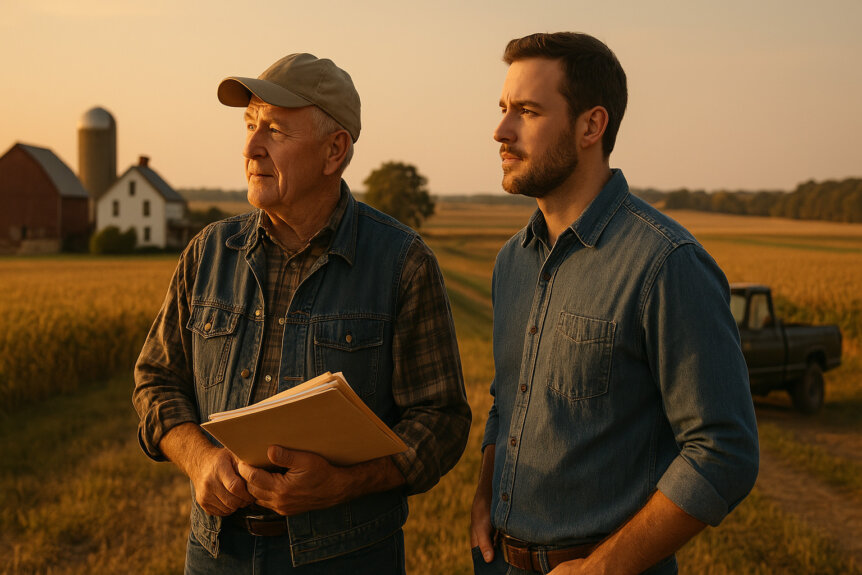For generations, farms across Illinois have been passed down from parent to child. But today, many families are asking the same big question: “How can I keep the farm in the family and ensure a smooth transition to the next generation?”
Estate and succession planning is essential for any business owner—but it’s especially important for farmers. Unlike other industries, farms often involve valuable land, tight margins, expensive equipment, and a deep emotional connection. In this blog, we’ll walk through how Illinois farmers can plan ahead to protect the farm, minimize taxes, and avoid family conflict.
Why Estate and Succession Planning Matters for Farmers
Farmers face unique challenges when it comes to estate planning. Farmland values have risen sharply in Illinois, and many farms are asset-rich but cash-poor. Without a proper plan in place, a sudden death or illness could force the sale of land, create tension among siblings, or leave surviving spouses without clarity or income.
That’s why proactive planning is critical. It gives you control over what happens to your land, business, and legacy—while reducing uncertainty and protecting your family.
Step 1: Start with a Will or Trust
At the very least, every Illinois farmer should have a legally valid will. This document outlines who will inherit your assets, including land, equipment, and livestock.
But for farms with significant value or complexity, a revocable living trust is often a better option. A trust allows your assets to transfer without going through probate, which can delay operations and expose your estate to public scrutiny.
A trust also allows for more control over how and when assets are distributed, especially if you’re planning to treat your children differently based on their involvement in the farm.
Step 2: Choose a Successor—and Communicate the Plan
One of the hardest decisions in succession planning is choosing who will take over the farm. If one child is actively farming and the others are not, dividing everything equally might not be the best option.
Some farmers make the mistake of not communicating their intentions, which can cause major problems later. It’s important to:
- Identify your successor (or successors) early
- Have honest conversations with all children and spouses
- Put your wishes in writing
- Update your estate documents regularly
Pro Tip:
Consider using life insurance to equalize inheritances. For example, if one child gets the farm, the others can receive insurance proceeds to balance things out.
Step 3: Minimize Estate Taxes and Legal Costs
Illinois farmers often worry about estate taxes eating away at their land and assets. As of now, the Illinois estate tax exemption is $4 million, and anything above that can be taxed up to 16%. (Federal exemptions are much higher, but still worth planning for.)
To minimize taxes and preserve the farm, you may want to:
- Create an irrevocable trust to move assets out of your estate
- Use gifting strategies during your lifetime
- Set up a Family Limited Partnership (FLP) or LLC to hold land and equipment
- Take advantage of IRS Section 2032A, which allows special use valuation for farms
These strategies require careful planning and legal guidance—but they can save your family tens or hundreds of thousands of dollars.
Step 4: Protect the Farm from Divorce and Creditors
Even if your kids get along today, life happens. Divorce, bankruptcy, or lawsuits could put your farmland at risk if ownership isn’t protected.
Forming a Limited Liability Company (LLC) or keeping land inside a trust can add a layer of protection by separating personal and business assets. You can also include restrictions on ownership transfers to prevent outsiders from gaining control of farm property.
Step 5: Update Your Plan Regularly
A farm succession plan isn’t a one-and-done process. You’ll want to review it regularly—especially after big life events, like:
- Marriage or divorce
- Births or deaths
- Changes in farm size or structure
- Retirement or disability
- Shifts in who is working the farm
Keeping your documents up to date ensures your plan stays relevant and enforceable.
Final Thoughts: Keeping the Family Farm in the Family
If you’re a farmer in Illinois, the best way to keep your land and legacy in the family is to plan ahead. The right estate and succession plan can help you:
- Decide who takes over the farm
- Protect land from taxes and legal threats
- Treat your family fairly and avoid future disputes
- Keep your farm running without interruptions
You’ve worked hard to build something meaningful. Don’t leave the future of your farm up to chance.
Need Help With a Farm Succession Plan in Illinois?
At Rincker Law PLLC, we understand the unique needs of Illinois farmers. Whether you’re starting from scratch or updating an old plan, we’ll help you protect your land, preserve your legacy, and keep your family farm where it belongs—for generations to come.
Call (217) 774-1373 today to schedule a confidential consultation.

